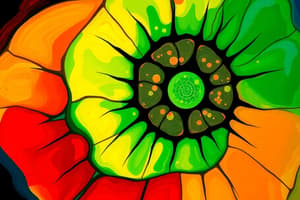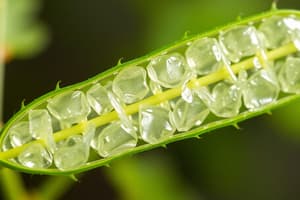Podcast
Questions and Answers
How do phytochromes influence germination in plants?
How do phytochromes influence germination in plants?
- They switch between active and inactive forms based on light conditions. (correct)
- They absorb ultraviolet light to enhance growth.
- They convert stored energy into sugars for the plant.
- They directly stimulate root growth during photosynthesis.
What is the effect of far-red light on seed germination?
What is the effect of far-red light on seed germination?
- It increases the time seeds remain dormant. (correct)
- It inhibits germination and encourages upward growth. (correct)
- It enhances the absorption of nutrients from the soil.
- It promotes immediate germination regardless of conditions.
Which factor primarily determines the flowering time of a plant?
Which factor primarily determines the flowering time of a plant?
- The amount of sunlight received.
- The temperature of the environment.
- The type of nutrients available in the soil.
- The duration of the night period. (correct)
In which scenario would a plant be less likely to germinate?
In which scenario would a plant be less likely to germinate?
What seasonal behavior is exhibited by some plants like spring ephemerals?
What seasonal behavior is exhibited by some plants like spring ephemerals?
Which of the following is true about the active (Pfr) and inactive (Pr) forms of phytochromes?
Which of the following is true about the active (Pfr) and inactive (Pr) forms of phytochromes?
How can a strong burst of red light disrupt a plant's flowering pattern?
How can a strong burst of red light disrupt a plant's flowering pattern?
What role does phototropism play in plant behavior?
What role does phototropism play in plant behavior?
What primarily drives the upward movement of water through the plant's xylem?
What primarily drives the upward movement of water through the plant's xylem?
What role do root hairs play in water movement within plants?
What role do root hairs play in water movement within plants?
What is the main consequence of transpiration in plants?
What is the main consequence of transpiration in plants?
What is the sequence of water movement from soil to xylem?
What is the sequence of water movement from soil to xylem?
In which part of the plant does guttation primarily occur?
In which part of the plant does guttation primarily occur?
What effect does transpiration have on the water potential gradient in a plant?
What effect does transpiration have on the water potential gradient in a plant?
How is sugar transported from the source to the sink in plants?
How is sugar transported from the source to the sink in plants?
What is the role of proton pumps in the translocation of phloem sap?
What is the role of proton pumps in the translocation of phloem sap?
What is the primary location of the light-dependent reactions in photosynthesis?
What is the primary location of the light-dependent reactions in photosynthesis?
What is a key outcome of the light-independent reactions, also known as the Calvin Cycle?
What is a key outcome of the light-independent reactions, also known as the Calvin Cycle?
Which structure within the chloroplast is involved in the formation of a proton gradient during photosynthesis?
Which structure within the chloroplast is involved in the formation of a proton gradient during photosynthesis?
What role does rubisco play in the Calvin Cycle?
What role does rubisco play in the Calvin Cycle?
How does transpiration primarily benefit plants?
How does transpiration primarily benefit plants?
Which of the following factors does NOT affect the rate of transpiration in plants?
Which of the following factors does NOT affect the rate of transpiration in plants?
What is the impact of photoperiod on plant growth?
What is the impact of photoperiod on plant growth?
What is transported through the plant's phloem?
What is transported through the plant's phloem?
Flashcards
Photoperiodism
Photoperiodism
Plants' seasonal behaviors, like flowering, based on light conditions.
Phytochromes
Phytochromes
Light-absorbing plant pigments that detect light and control plant behavior.
Pfr (active)
Pfr (active)
Active form of phytochrome, promoting germination and branching.
Pr (inactive)
Pr (inactive)
Signup and view all the flashcards
Germination
Germination
Signup and view all the flashcards
Tropisms
Tropisms
Signup and view all the flashcards
Phototropism
Phototropism
Signup and view all the flashcards
Night length
Night length
Signup and view all the flashcards
ET50
ET50
Signup and view all the flashcards
Photosynthesis Diagram Requirements
Photosynthesis Diagram Requirements
Signup and view all the flashcards
Light-Dependent Reactions
Light-Dependent Reactions
Signup and view all the flashcards
Calvin Cycle
Calvin Cycle
Signup and view all the flashcards
Transpiration
Transpiration
Signup and view all the flashcards
Photosystem I and II
Photosystem I and II
Signup and view all the flashcards
Electron Transport Chain
Electron Transport Chain
Signup and view all the flashcards
H+ Gradient
H+ Gradient
Signup and view all the flashcards
Xylem tissue
Xylem tissue
Signup and view all the flashcards
Cohesion & Adhesion
Cohesion & Adhesion
Signup and view all the flashcards
Root Pressure
Root Pressure
Signup and view all the flashcards
Guttation
Guttation
Signup and view all the flashcards
Water Potential (Ѱw)
Water Potential (Ѱw)
Signup and view all the flashcards
Source cells
Source cells
Signup and view all the flashcards
Sink cells
Sink cells
Signup and view all the flashcards
Study Notes
Today's Tasks
- Discuss productivity activity
- Photosynthesis diagram
- Homework: HW #3, HW quizzes 1 & 2 due day 2
Photosynthesis Diagram
- Draw a detailed diagram of all the reactions in photosynthesis.
- Use a piece of green paper.
- Follow instructions from the next slide.
- Due on test day.
Chloroplast Structure
- Cytoplasm
- Outer membrane
- Inner membrane
- Thylakoids
- Grana
- Stroma
- Lumen
- Light reactions
- Location
- Inputs/reactants: Source of e-, Source of H+
- Photosystem I and II
- Path of electrons
- Electron transport chains
- H+ gradient
- NADPH formation
- ATP synthase
- Outputs/products: Source of O₂ waste
Cyclic electron flow
- Where?
- When?
- Why?
Light-Independent Reactions (Calvin Cycle)
- Location
- Inputs/reactants: Energy carriers, Carbons
- Starting compound
- Rubisco and carbon fixation
- Regeneration of starting product
- Outputs/products
ET50
- The effective time it takes for 50% of leaves to float.
- Data in graph (refer to image).
Transpiration Lab
- Conduct the transpiration lab.
- Complete the worksheet.
- Pay attention to water potential.
- Due date: Day 3
Homework quiz #3
- Due date; Day 3
Productivity Activity
- Collect the activity materials.
- Due date: Day 3
EQ 4.4a: Transpiration
- Activities: Transpiration interactive, Transpiration lab (dry lab)
EQ 4.4b: Signaling
- Activities: Plant cell signaling
- Tasks: Finish Photosynthesis diagram, Collect Productivity Activity
Plant Cell Signaling
- EQ: How do plants respond to conditions in their environment?
- Plant behaviors accomplished through chemical signaling.
Photoperiodism
- Seasonal behaviors
- Some plants flower in winter, some in summer.
- Some flower independent of light conditions.
- Day length requirements for flowering in three categories of plants: Short day plant, Long day plant, Natural day plant
Tropisms
- Phototropism
- Gravitropism
- Thigmotropism
Germination
- Plant seeds break dormancy and sprout at the beginning of their ideal growing season.
- Phytochromes are light-absorbing pigments that respond to light and influence a plant's behavior.
- Red light = increases germination, branching and is abundant in direct sunlight
- Far-red light = inhibits germination, increases upward growth.
Phytochromes
- Photo-reversible, alternating between active (Pfr) and inactive (Pr) form.
- Pfr induces germination. Red light is absorbed by mature plants who are in a good spot to grow.
- Seeds in shade receive more far-red light, which inhibits growth, so seed stays dormant.
Water Potential (Ψw)
- High in xylem, low in the air.
- Water moves from high to low.
Transpirational Pull
- Water vapor evaporation from leaves pulls water up the xylem through cohesion and adhesion.
- Due to differences in Ψw between xylem, leaf spaces, and the air..
Root Pressure
- Root hairs increase surface area (mycorrhizae).
- Selective transport of minerals occurs, then water follows via osmosis.
- No energy needed to move water.
- Leads to guttation.
Translocation of Phloem Sap
- Source to sink.
- Sugar moves from source cells into phloem cells (sieve-tube members), driven by proton pumps.
Water Cycle (Diagram)
- Shows the different stages and processes involved in the water cycle..
Homework:
- Enjoy your break!
- Test on day 2.
Studying That Suits You
Use AI to generate personalized quizzes and flashcards to suit your learning preferences.




